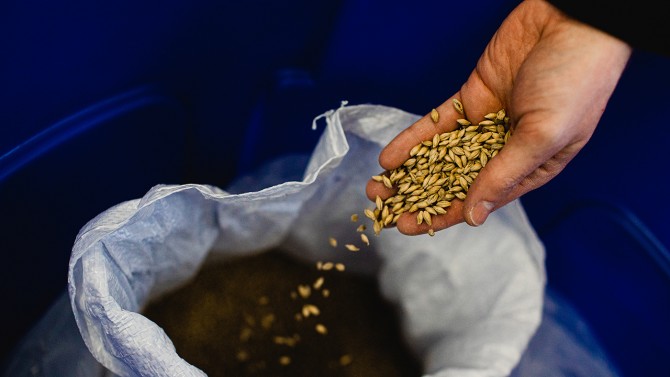Cornell has developed the first variety of spring malting barley designed to succeed in New York's wet climate and support the state's $5 billion craft beer industry. All it needs now is a name.
The College of Agriculture and Life Sciences (CALS) and the New York State Department of Agriculture and Markets are co-hosting a naming contest, Nov. 12 through Dec. 3, for this promising new variety - currently called CU-31. All those interested in New York craft brewing can review the rules and submit their entries through the contest's online form.
A winner will be announced Dec. 16 at the virtual Empire State Barley and Malt Summit, which is offering free public registration this year. The winning contestant will receive a growler of New York state beer, courtesy of the New York State Brewers Association.
Released in March by plant breeders at CALS, the grain is critical to the success of New York state craft brewers striving to meet standards set by the 2012 Farm Brewing Law, which requires brewers to steadily increase the amount of state-sourced ingredients used in their beer. Currently, the requirement is 60% of all ingredients; on Jan. 1, 2024, that will increase to 90%.
CU-31 - which resists local fungal pathogens and preharvest sprouting in the state's wet climate - is being commercially grown for seed and will be available to New York brewers by fall 2021.
"The variety has demonstrated great uniformity, plump kernels, stiffness and large head size, said Francis Domoy, a fifth-generation grain and vegetable farmer near Rochester, New York, and one of the first to grow CU-31 commercially for seed in the state.
Domoy was involved in the research trials for the variety from 2017-18, and said it was "an honor to be part of the CU-31 development story."
New York has the second-highest number of breweries of any state in the U.S., with a total economic impact of $5.4 billion in 2018, according to New York state statistics. Today, New York is home to 472 breweries, including 268 farm breweries - a 350% increase since 2012. Demand for local brewing ingredients is high, but until a few years ago a hardy New York-adapted spring malting barley variety didn't exist.
In 2014 - with support from Gov. Andrew Cuomo, Ag and Markets and the Genesee Valley Regional Market Authority - CALS plant scientists teamed up with Cornell Cooperative Extension (CCE) educators to inform farmers about best growing practices for malting barley. Also that year, less than half the grain grown in New York met quality standards for use in malt houses; by 2017, more than 70% of the grain met the standards, thanks to the team's efforts.
The first New York-adapted spring malting barley variety released this past spring, shown here being prepared for malt at Cornell AgriTech in Geneva, New York.
"It is critical that we develop avenues for New York's brewing industry to continue to succeed while supporting our agricultural producers," said Richard A. Ball, Ag and Markets commissioner. "The Farm Brewery License (Article 4, Section 51-A of the state's Consolidated Laws) was created to not only strengthen our craft beverage industry but also to promote the use of local agricultural ingredients. We are proud to support the work that Cornell CALS has done, in partnership with Cornell Cooperative Extension, to ensure our growers and brewers have optimal growing methods and ingredients to continue making some of the most unique and best craft beers in the country."
"Born, Bred and Brewed in New York" - as the grain development program is called - aptly describes Cornell CALS and CCE efforts to give the state's brewing industry a tremendous boost and is the latest effort of Cornell CALS' more than 100-year-old barley breeding program, committed to research, teaching and outreach.
"This new variety is a prime example of our commitment to our land-grant mission," said Benjamin Houlton, the Ronald P. Lynch Dean of CALS. "The innovation, dedication and expertise of our researchers and outreach experts, coupled with the support of our state and community partners, makes the process smoother for creating critical New York-adapted plant varieties for our statewide industries."
Jenny Stockdale is associate director for marketing communications in the College of Agriculture and Life Sciences.








